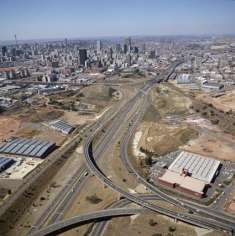Public-Private sector partnerships
A strong emerging investment opportunity is through public-private sector partnerships. These initiatives require the contribution of private companies because the government cannot finance them alone. Projects are underway at the national, regional and local levels.
There is also a great need for skills development and transfer. The government is delivering houses, electricity, water, land, free health care, education and training, protection of civil and workers' rights and has improved transport and communication to millions of South Africans.
But the war on poverty is not over. Several of these programmes have shifted in direction or gathered new impetus following a period of policy review and consolidation. And in other areas, there are new challenges to address.
Alongside South Africa's own social and development policy commitments, the country is playing a leading role in the New Partnership for Africa's Development.
From eco-tourism to the information superhighway, from regional trade promotion to participation in United Nations peacekeeping operations - new engagements on the continent and in partnership with other developing nations have brought new opportunities and demands on resources.
Social investment opportunities
Project spend amounted to over US$5,8bn for the period 1994 to 2000, according to the fifth edition of Doing Business in South Africa published by Kogan-Page in the United Kingdom and sponsored by Absa Corporate Bank. The demand for building materials and companies involved in construction, electrification, water reticulation, sewerage and telephone installation will receive a strong stimulus from various infrastructural programmes.
The construction of 200 000 to 300 000 houses per year and the improvement of the situation whereby only one in three people have access to electricity will provide substantial opportunities for investment.
Already the electrification programme undertaken by the parastatal Eskom, the electricity supplier, is exceeding set targets, as has the rollout of telephone facilities in previously disadvantaged areas by fixed line operator Telkom. The government is currently in the process of offering the licence for a second fixed-line operator.
The Department of Transport has embarked on more than 20 major road projects, (including toll roads) worth more than R5 billion over two years – many of which have brought substantial benefits to local communities.
The creation of Spatial Development Initiatives (SDI) in over 10 regions in the Southern African Development Community (SADC) is also leading to major infrastructural developments.
Other related opportunities will arise from human resource development. Education and training implies a need for stationery, school furniture and related materials. Industries involved in supplying this sector could blossom in a country in which the need for education is of vital importance if sustainable economic growth is to be achieved.
Government spending
If public infrastructure spending on construction goods and services is examined in more detail, it is clear that construction works made up the vast bulk of the investment of both public authorities and public corporations.
In the case of public authorities, these construction works would largely comprise the roads, water and sanitation reticulation needed for the development of communities. They would also include the national highway system and bulk water and sanitation infrastructure (dams and treatment plants).
The peak investment was in the early 1970s and such infrastructure investment has been declining ever since. However, the election of a democratic government in 1994 turned the trend and the past three years have brought an increase in such infrastructure investment.
Public-sector economic infrastructure investment has consistently predominated over investment in social infrastructure. Economic infrastructure is defined by the South African Reserve Bank as "roads, bridges, dams, electricity and water supply" while social infrastructure is defined as "schools, hospitals, etc. and administrative services".
Development Bank of South Africa
The Private Sector Investments Unit of the Development Bank of Southern Africa (DBSA) plays a unique role in facilitating private sector provision of infrastructure
in support of sustainable economic development in the SADC region.
The unit was established in 1996 in response to a worldwide trend towards increased private sector involvement in infrastructure, and in recognition of the need for an appropriate source of financial support for Public Private Partnerships (PPPs) in Southern Africa.
The DBSA aims to promote economic development by fostering the growth of productive enterprise and efficient capital markets within the regional and sectoral requirements of DBSA's mandate. Its focus is on four broad infrastructural groups: basic infrastructure services to the community (eg water and sanitation), economic infrastructure (eg telecommunications, toll roads, rail, power), industrial/agribusiness projects with infrastructure components, and capital market development.










